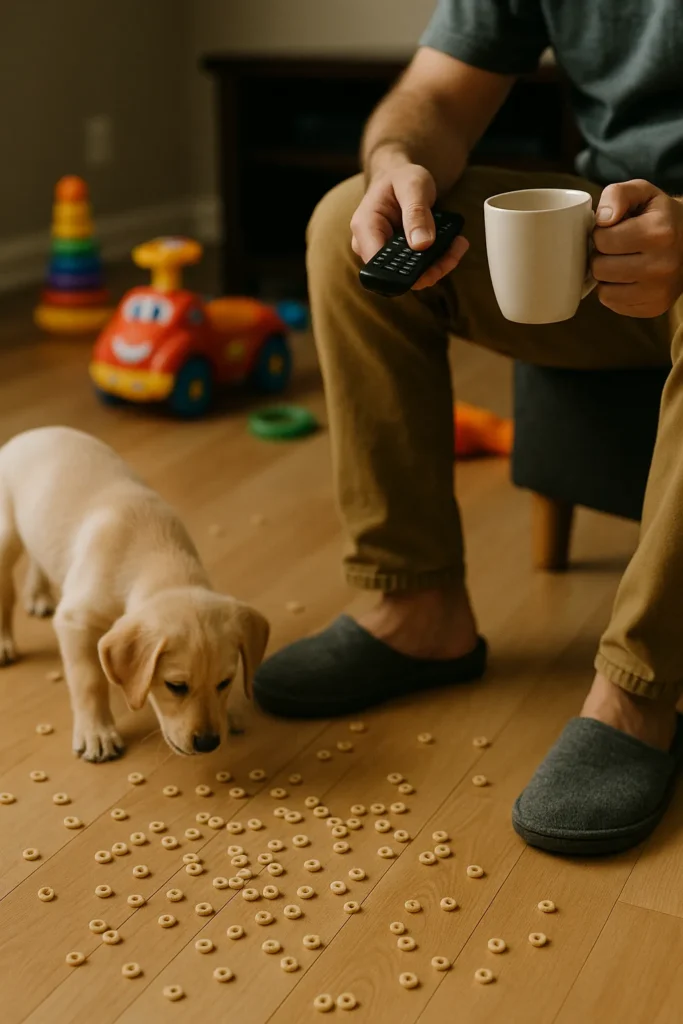The 5:11 AM Reality Every Dad Faces on Tough Days
Tough days start early. At 5:11 a.m., the house is quiet in that way only parents recognize. Not peace, just the shaky stillness before the first ripple.
The beagle (five years old, stubborn as truth, and the one with the health issues) lets out a soft whine from her bed. Our golden, not even a year yet, thumps the floor with a puppy tail that’s bigger than his body. The rescue (likely a dachshund mix, best guess) pads in, head tilted, asking questions with eyes he never learned to put into barks.
Down the hall, our kids flip in their beds like fish in a net. Our 4-year-old daughter and 5-year-old son sense the day coming. On my phone, a missed FaceTime from my 18-year-old daughter out west pops up. She’s headed to college and we’re proud in that aching kind of way that sits behind the ribs.
The calendar blinks travel logistics with toddlers (may the odds be ever in our favor). Underneath it, my wife’s text from last night that I’ve read too many times: “I feel like we’re just co-existing.”
Coffee breathes steam. My mind is already sprinting through tough days ahead: work tension from yesterday, the beagle’s meds schedule, car seats, snacks, sanity, marriage, money.
On mornings like this, life looks like a par-5 dead into the wind. Everything feels uphill. These are the tough days that test every dad.
I’ve learned (slowly, painfully) that tough days like this require calling your mental caddie.

What Is a Mental Caddie and Why Tough Days Demand One {#mental-caddie-definition}
A mental caddie isn’t someone to carry your clubs. It’s someone to carry your focus when tough days threaten to overwhelm you.
The inner voice I’ve trained. The outer circle I’ve found. Men at DadGood.co, the Golf Ball Wisdom crew, a handful of brothers who don’t flinch when I text: “Hey, tough days are hitting hard.”
Why Tough Days Require a Different Approach
Research from the American Psychological Association shows that 30.6% of men experience depression, anxiety, or other mental health challenges. But here’s what the studies miss: tough days don’t announce themselves. They ambush you at 5:11 AM when everything feels impossible.
Traditional advice tells you to “push through” tough days. That’s hero ball thinking. It doesn’t work for golf, and it definitely doesn’t work for dad life.
Your mental caddie gives you what you need most on tough days: clarity when your vision is fogged.
The 3-Line Framework That Transforms Tough Days {#framework}
Before the house wakes up for real on tough days, I pull a notecard and write three words:
🌤️ Weather: What’s true right now (no drama)
Kids are safe. Beagle ate. Golden is happy chaos. The dachshund-mix rescue is watchful. Wife is exhausted, not my enemy. We’re okay.
On tough days, your brain wants to catastrophize. Weather grounds you in facts, not fears.
💨 Wind: What’s pushing against me today?
Work friction, marital distance, dog health anxiety, travel with toddlers, the ache of parenting across state lines.
Tough days always have headwinds. Naming them removes their power to blindside you.
🎯 Line: What’s the one good shot today?
Protect connection over perfection.
Tough days get easier when you aim for one target instead of ten.
This isn’t magic. It’s just aim. The difference between flailing at the ball and swinging with intention. That’s what a mental caddie gives you when tough days steal your clarity: a clear line.

When Morning Chaos Hits: Tough Days at 10 AM {#morning-chaos}
By 10 a.m. on tough days, I’ve had three conversations at work and felt unseen in at least two of them. I breathe shallow, old stories loading in the background: prove yourself, fix everyone’s mood, don’t drop a single ball.
I check the meds schedule. The beagle takes her pill like it’s betrayal. The golden chases his tail into a lamp like joy can’t be contained. The dachshund-mix rescue leans against my knee, steady as a lighthouse.
My 4-year-old daughter dumps a box of cereal and declares it a Cheerio beach. The 5-year-old negotiates like a New York attorney for more screen time while I talk to the vet. My wife and I pass each other in the kitchen, two ships with laundry. We say the logistics, not the feelings.
The Hero Ball Trap That Makes Tough Days Worse
On tough days, I want to do more. Carry more. Muscle through. That’s my default swing: hero ball.
Instead, I text my guys:
“Tough days are hitting hard. Wife and I feel like roommates. Work was a grind. Beagle’s meds got me anxious. We have to travel with the little dudes. I’m carrying the day like it’s all on me. Give me a yardage.”
The replies come fast because that’s what brothers do when tough days require backup:
“Tonight: 10 minutes with your wife. No fixing. Two questions only: ‘Where are you?’ and ‘How can I carry part of that bag tomorrow?'”
“Pre-stage the travel. Lower expectations by 30%. Define one memory to make, not ten tasks to complete.”
“Walk the dogs at sunset. Breathe with the rescue’s pace. Call your 18-year-old on the way back.”
That’s the gift of community on tough days. You get borrowed clarity when yours is fogged in.

The Connection Breakthrough That Changes Tough Days {#connection-breakthrough}
I steal five minutes and FaceTime my daughter out west. She’s tired, excited, pretending not to be nervous. I tell her the truth I needed at 18: “Bravery is just choosing the next good shot. You don’t have to play all 18 holes in your head before lunch.” She smiles. We lose connection.
That’s life, I guess. Loving someone far away is learning to keep the thread without strangling it. Even on tough days.
Back home, the kids’ laughter ricochets down the hallway. My wife asks if the dog ate. I nod. We trade a look that says, We’re tired, not broken. The golden skids by, wearing a sock crown. I catch myself wanting to correct everything. Instead, I choose presence over performance.
I kneel, eye level with our five-year-old son (the King of Socks), and we laugh.
It’s a small putt on tough days. It counts.
The Mindset Shift That Saves Tough Days
Here’s what I learned about tough days: Connection beats perfection every single time.
Research from Harvard’s Study of Adult Development proves that relationships are the strongest predictor of life satisfaction. Not achievement. Not money. Not even eliminating tough days entirely.
Relationships.
On tough days, your kids don’t need a perfect dad. They need a present one.
Handling Curveballs on Tough Days {#handling-curveballs}
The vet calls with the “monitor closely” speech that sounds like a lullaby for worry. I feel the panic rise, the part of me that wants a spreadsheet for the future. On tough days, anxiety loves to multiply problems.
My inner mental caddie clears his throat:
“We’re not in tomorrow. We’re here. Give the beagle her meds. Put an alarm in your phone. Call if something changes. Return to the shot in front of you.”
The Mental Reset That Actually Works on Tough Days
The 4-year-old melts down because his microwaved mac has one noodle that looks “wrong.” My work email dings with a request that feels like a command. My wife texts “when are you off?” and I read it through the lens of failure.
Tough days amplify everything. Small problems feel massive. Normal requests feel like attacks.
I grab the notecard again:
Weather: We’re safe. Dog is okay right now. I’m tense; I can choose softer words.
Wind: Defensiveness, rushing, old stories.
Line: Slow down. Five breaths. Say what’s true, not what hurts.
There’s this moment on a long par-5 where you stop trying to win the hole and commit to playing it well. That’s the shift on tough days. That’s the mental caddie’s whisper.

Evening Solutions That Actually Work on Tough Days {#evening-solutions}
After dinner, we load the stroller with snacks the boys will absolutely not want and take the three-dog parade around the block. The golden learns “heel” for about six seconds at a time (a personal record). The dachshund-mix rescue chooses the pace: steady, kind. The beagle trots like dignity on four legs.
Even on tough days, this walk saves us.
The Two Questions That Rescue Marriage on Tough Days
I ask my wife, quietly, so the question can be heard:
“If today were a hole on the course, where did we lose strokes?”
She laughs, then exhales. We name the moment we missed each other on these tough days: rushing the morning, answering logistics instead of feelings.
We pick a small repair: 10 minutes every night after the kids are down. No phones. No fixing. Two questions. Eye contact. Maybe a hand on a knee when the words are slower than the feelings.
On the way back, I call my college kid. We talk about nothing important and everything that matters. When I hang up, I feel the ache and the gratitude.
That’s adulthood: carrying both without pretending one cancels the other. Especially on tough days.

The Daily Score That Actually Matters on Tough Days
The kids ask for “water, then more water, then the water we had before,” and finally the house settles into a softer quiet. I write one sentence in my notebook:
“Today, we chose connection over perfection.”
That’s a win on tough days. Not because we crushed it, but because we stayed with it. With each other, with the dogs, with the work of building a life that’s more together than impressive.
And when tough days got heavy, I did the thing I used to avoid: I called in my mental caddie. My inner voice, my men, my community. They didn’t swing for me. They pointed at a line I could hit.
Your Mental Caddie Playbook for Tough Days {#playbook}
🎯 Strategy #1: The 3-Line Reset Card for Tough Days
Weather / Wind / Line. Write it on a card. Keep it on the fridge or your phone. Use it when tough days cloud your judgment.
💬 Strategy #2: Two-Question Marriage Huddle
When tough days strain your relationship: “Where are you?” and “How can I carry part of that bag tomorrow?” Ten minutes. No phones. Eye contact.
🤝 Strategy #3: Borrow a Yardage from Your Crew
Text one brother: “Tough days are hitting. Next right shot?” Do just that. Community clarity beats solo confusion every time.
✈️ Strategy #4: Travel with Toddlers (Tough Days Version)
Pack early. Lower expectations by 30%. Define one memory to make. Measure success in smiles, not schedules. Tough days require realistic planning.
🐕 Strategy #5: Dog-Health Anxiety Management
Make the plan with your vet. Set alarms. Follow the plan. Don’t have imaginary conversations with the future. Tough days amplify worry; structure calms it.
💼 Strategy #6: Work Tension Strategy for Tough Days
Replace “prove” with “clarify.” Ask for the real goal of the task in one sentence. Tough days make communication harder; be intentional.
📝 Strategy #7: End-of-Day Purpose Practice
One line in a notebook: “What worked today?” Train your brain to see the line, not just the wind. Tough days need intentional gratitude.

You Don’t Need a Perfect Life on Tough Days. You Need a Mental Caddie.
If this feels like your house on tough days (tiny humans, big feelings, a dog with a pharmacy, work that takes more than it gives, a marriage trying to find its groove), you’re not alone.
The scorecard doesn’t reward heroics on tough days. It rewards the person who can choose the next good shot with humility, honesty, and help.
That’s the work we do at Golf Ball Wisdom. When tough days feel impossible and you need a trained voice in your ear with a brotherhood at your back:
🎯 Ready for Your Mental Caddie on Tough Days?
Book Your Free Mental Caddie Session →
No pitch. No pressure. Just a real, judgment-free conversation about your tough days, your struggles, and your next right shot.
Shop Golf Ball Wisdom →
Purpose-built gear that funds more work with dads navigating tough days.
Bring your mental caddie to tough days. The wind won’t stop, but neither will you.
Quick Answers for Tough Days FAQ {#faq}
Q: What do I do first when tough days are already overwhelming?
A: Write Weather / Wind / Line on a card. One small, clear target beats 10 vague goals on tough days.
Q: How does a community actually help during tough days?
A: Communities like DadGood.co and Golf Ball Wisdom provide borrowed clarity when tough days make your thinking cloudy.
Q: My spouse says we’re co-existing. How do we reconnect on tough days?
A: Try the nightly 10-minute huddle: two questions, no fixing. Hold hands if words are slow. Tough days need intentional connection.
Q: Any real tips for traveling with toddlers during tough days?
A: Pre-stage bags, build buffer time, lower expectations by 30%, and decide one memory to create. Success is connection, not schedule. Tough days require grace.
Q: What if anxiety about problems keeps hijacking tough days?
A: Confirm the plan with professionals, set alarms, follow the plan, and stop rehearsing emergencies you’re not in. Tough days amplify worry; structure calms it.
Q: How do I build a mental caddie support network for tough days?
A: Start with one text to one brother: “Tough days are hitting. Need a yardage.” Build from there. Consistency over perfection. Tough days require backup.
Q: What if tough days happen more often than good days?
A: That’s when professional help becomes essential. A therapist can be your ultimate mental caddie. Psychology Today helps you find local support. Tough days don’t have to define your life.
Related Articles That Help With Tough Days
- The Last Words I Almost Wrote: A Story of Men’s Personal Growth
- Mental Endurance in Business: Why I Still Show Up
- Step Onto the Tee: Your Game, Transformed by a Leadership Caddie
About the Author: Keith Goff is the founder of Golf Ball Wisdom, a movement helping men and teens build mental resilience through golf. With 20+ years of coaching experience and a degree in human development, Keith specializes in guiding fathers through tough days using wisdom found on the golf course.
